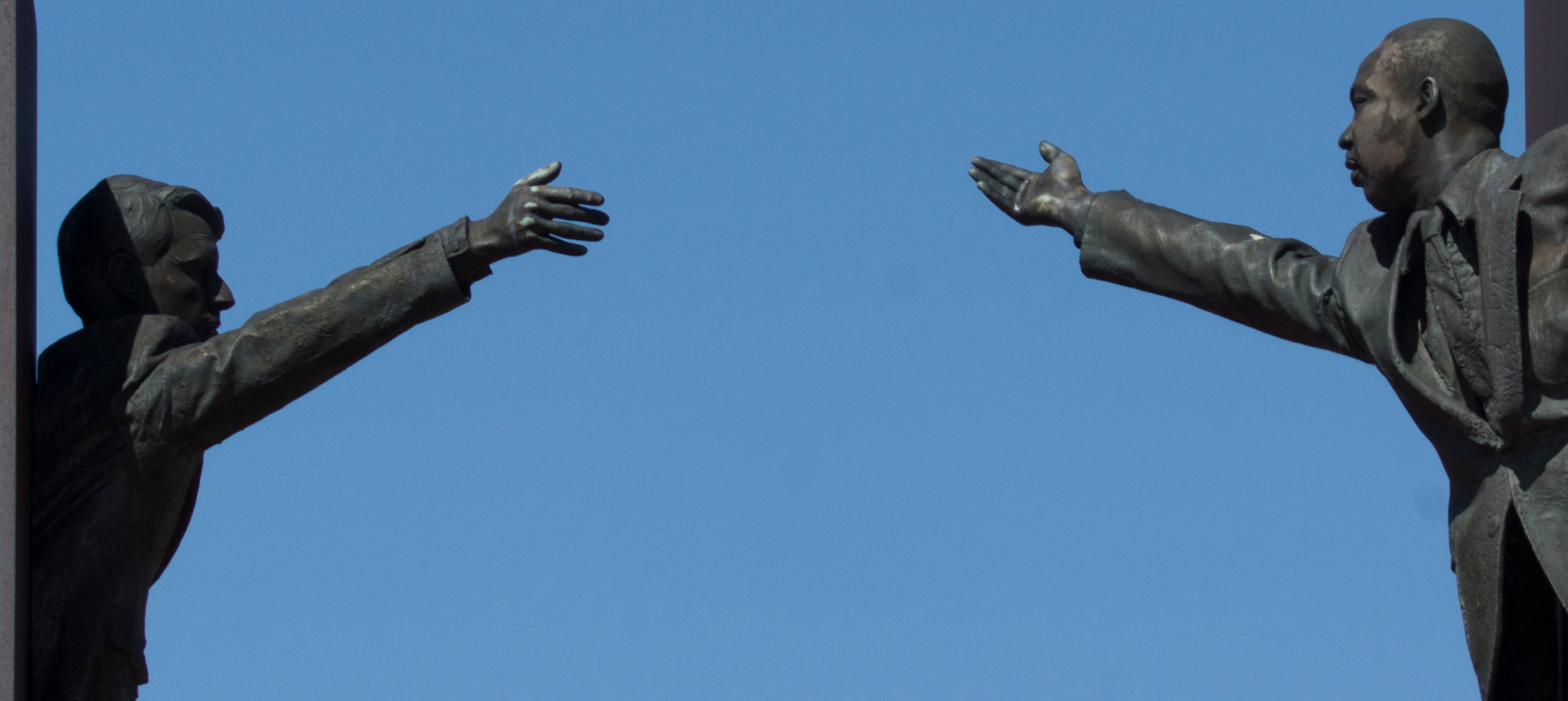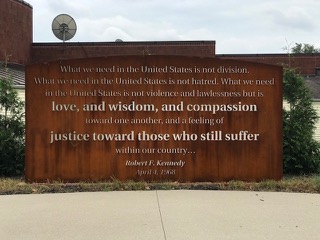PRESS ROOM
OFFICIAL HASHTAGs: #stillwereach #KENNEDYKING
Op-eds
Indy Star | June 7, 2020
”We must value the humanity of each and every life”
by Darryl Lockett (executive director, Kennedy King Memorial Initiative) and Greg Porter (board president, Kennedy King Memorial Initiative)
ARTICLE TEXT:
As it did 52 years ago following the deaths of Dr. Martin Luther King Jr. and Sen. Robert F. Kennedy, the tragic events of the past weeks have brought to the foreground a pain and suffering that has become too much to tolerate. We cannot allow ourselves to become immune to the pain caused by any act of violence or become passive witnesses in the face of injustice.
We recognize that our community and our country are hurting and that our past prescriptions for redress are not sufficient in treating the sense of anguish and sorrow, and the despair and discord we are experiencing. We must hold space for the heartache, frustration and sense of helplessness that many feel, and raise our collective consciousness to the circumstances and truths that inspire such emotions. We must champion a renewed call for action centered on the needs of the dispirited.
As we position ourselves to dismantle systemic structures of inequality, to look for answers at roundtables of concerned citizens, or simply attempt to process the terrifying images we have witnessed in recent days, let us all take time to reflect upon the lives of George Floyd, Ahmaud Arbery, Breonna Taylor, Dreasjon Reed, and the lives of those in Indianapolis whose gifts and talents have been threatened or lost. Each life lost was one overflowing with unique skills, innovative ideas, creative contributions that our cities, our country, and our world will not be able to replace.
Realizing the possibilities and potential that lie within each member of our community, we must value the humanity of each and every life. Despite the challenging life circumstances that many in our community may face as a result of structural inequality and systemic injustice, we must believe that each person is a much-needed asset to the collective advancement of our community.
The story of the Kennedy King Memorial Initiative is a story of grief and activism. On April 4, 1968 Sen. Kennedy, standing on the back of a pickup truck at 17th and Broadway streets in Indianapolis, leaned into the grief he had just experienced in the violent death of Dr. Martin Luther King Jr. Addressing the Indianapolis community assembled — many of whom were filled with hatred and mistrust in the wake of King’s assassination — Kennedy displayed an extraordinary courage and strength promoting an empathetic response of “love and wisdom, and compassion toward one another, and a feeling of justice toward those who still suffer.”
Fifty-two years later, we continue to benefit as a city from the leadership he displayed and the grief-inspired activism of the days and months that followed. Today, we summon that courage and strength as our community seeks to constructively channel the pain we collectively feel into lasting action.
Understanding the historical significance and effectiveness of grief-inspired activism, the Kennedy King Memorial Initiative believes the injustices and divisions that scourge our community will only be healed with courageous conversations, meaningful deeds, and substantive policy changes. To transform this city and our country into the “beautiful symphony of brotherhood,” we must implement a collective impact approach with a common agenda, mutually reinforcing activities, and continuous communication.
Without the commitment and dedication of our leaders and those who elect them, the religious and the nonbelievers, civic organizations and radical individualists, we will find ourselves repeating the acts of violence, replanting the seeds of mistrust, and reinforcing the disunions of society.
Indy Star | February 23, 2020
“The adult criminal justice system is no place for children”
by Monica Smith (program officer, Robert F. Kennedy Human Rights) and Darryl Lockett (executive director, Kennedy King Memorial Initiative)
ARTICLE TEXT:
Hours after the assassination of Dr. Martin Luther King, Jr. in 1968, Robert F. Kennedy climbed onto the back of a pick-up truck in Indianapolis and spoke the following words, “We can make an effort, as Martin Luther King did, to understand and to comprehend, and to replace that violence, that stain of bloodshed that has spread across our land, with an effort to understand with compassion and love.”
Yet 52 years later, a bill being considered by the Indiana House of Representatives would require us to abandon those principles, instead incarcerating our children in adult jails and prisons.
The measure — Senate Bill 449 — would drastically increase the number of Indiana children prosecuted in adult court, a practice, which statistics show, dramatically increases their exposure to violence and sexual abuse, as well as their chances of committing suicide while incarcerated in adult facilities.
Ignoring the fragility of youth, the bill would only trap more of Indiana’s children in the adult criminal legal system without developmentally appropriate alternatives to incarceration, a cornerstone of the juvenile justice system. That means fewer opportunities for education, social and emotional learning, family support programs, mentoring, and other forms of community investment — rehabilitative measures that give children a much greater chance of exiting the criminal justice maze.
Plain and simple, prosecuting children in the adult system overlooks common sense approaches to community safety, work we’ve become involved in as we seek to celebrate, honor and further both Kennedy and King’s legacies.
Indianapolis teachers have used Speak Truth to Power, a human rights education tool, for six years. Last year, Robert F. Kennedy Human Rights partnered with the Kennedy King Memorial Initiative to train a cohort of 30 educators with plans of expanding the program statewide. A key component is social and emotional learning, built into lesson plans and monthly educator development sessions. Learning to manage emotions, set and achieve positive goals, feel and show empathy for others, establish and maintain positive relationships, and make responsible decisions can help these youths avoid the criminal justice system altogether. Programs like this are proven alternatives to incarceration. They’re also a smart investment costing far less than it would to incarcerate a child.
We urge the members of the Indiana House of Representatives and Gov. Eric Holcomb to defeat SB 449 and invest in Indiana.
Monica Smith is a program officer at Robert F. Kennedy Human Rights, a nonpartisan, not-for-profit organization that has worked to achieve Robert Kennedy’s dream for a more just and peaceful world since 1968. She was previously a public defender in Kentucky, an attorney for children in Louisiana, and the director of court advocacy for a nonprofit in New York.
Darryl Lockett is the executive director of the Kennedy King Memorial Initiative, a 501(c)3 organization based in Indianapolis that works to commemorate the historic speech delivered by Sen. Robert F. Kennedy on the night that Dr. Martin Luther King, Jr. was assassinated.
Press releases
Click dates to view or download PDFs
April 2, 2021: 2021 Trailblazer, Community Builder and Spirit & Truth Legacy Award Recipients
March 29, 2021: KKMI 53rd Commemoration Ceremony
April 1, 2020: Kennedy King Memorial Initiative Takes Multimedia Approach to Still We Reach: 52nd April 4th Commemoration
January 24, 2020: Kennedy King Memorial Initiative Names Darryl Lockett Executive Director
January 14, 2020: Kennedy King Memorial Initiative Honors Dr. Martin Luther King, Jr. During MLK Day of Service
March 4, 2019: Kennedy King Memorial Initiative receives $10,000 from The Mind Trust to train 30 local teachers on the Robert F. Kennedy Human Rights Speak Truth to Power Curriculum
Articles
Click the publication logos below to link directly to articles.
The Kennedy King memorial is located within Dr. Martin Luther King, Jr. Park at 601 East 17th Street, Indianapolis, IN 46202. The park is open to the public from dawn to dusk.
Media visits & filming requests
The Kennedy King Memorial offers complimentary admission. Please contact our Public Relations team at least 48 hours prior to your visit to arrange attendance or a tour. If your visit is specifically to fact-gather for a story, please state so in your email and your request will be expedited.
Please visit Indy Parks for details about their photo policy.
Digital images & video
Unless otherwise stated, all photos are © Kennedy King Memorial Initiative. Photos are explicitly for editorial purposes only. Click thumbnail images to enlarge and download.
historical
To film on-site, please contact our Public Relations team (allow 24 hours for a response.) Hi-res images of Sen. Robert Kennedy and Dr. Martin Luther King Jr. in Indiana are available through the Indiana Historical Society.
Landmark for Peace
Visit our Flickr page for more photos.












